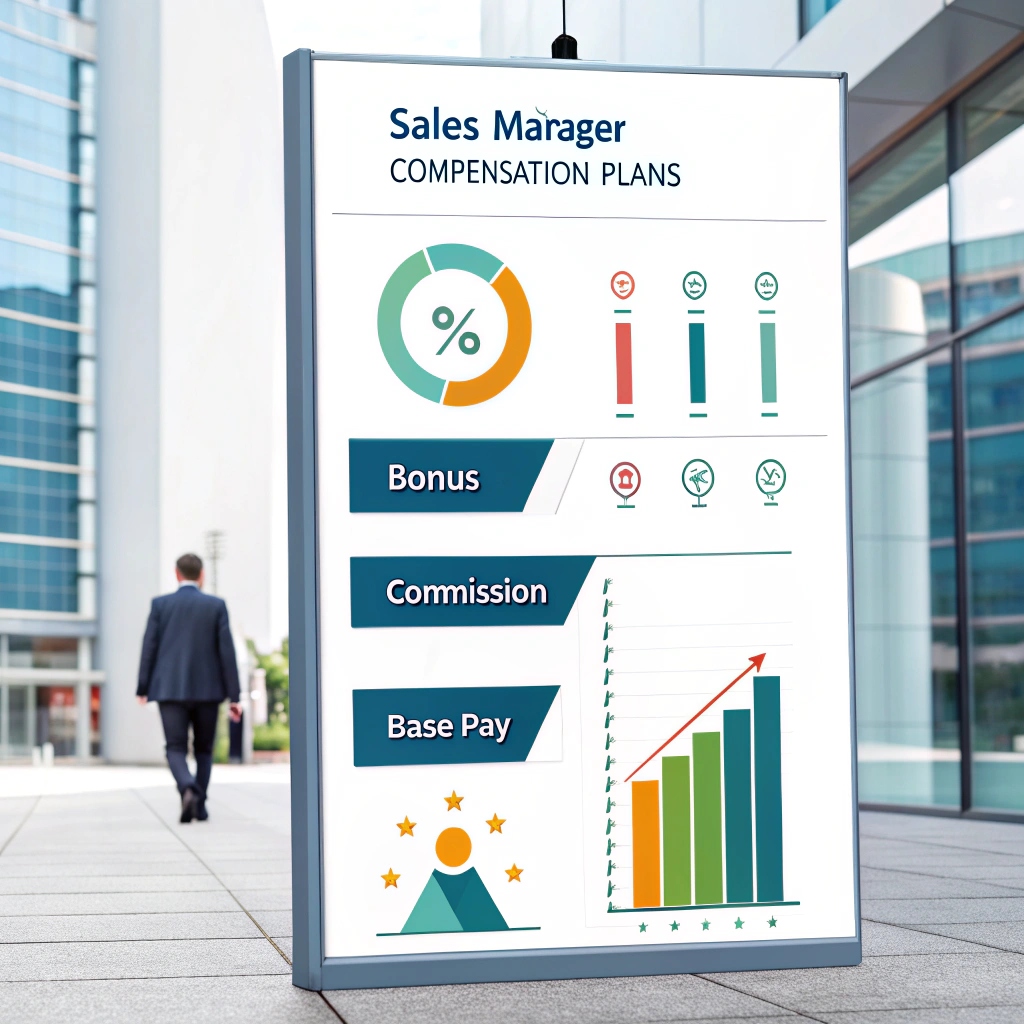
If you’ve ever wondered how to compensate your sales managers fairly while motivating them to drive results, you’re not alone. Choosing the right mix of base salary, commissions, and bonuses can be a tricky balancing act. It directly impacts motivation, retention, and ultimately your company’s growth. In this blog, we’ll break down the differences, advantages, and best practices for each compensation component to help you craft sales manager compensation plans that actually work in 2025.
Why Sales Manager Compensation Needs a Strategic Approach
Sales managers don’t just sell—they lead teams, coach reps, strategize, and own targets. Their pay structure should reflect this blend of responsibilities.

- Base pay provides stability
- Commission drives results tied to sales performance
- Bonuses reward achievement of broader goals
Getting the right balance keeps sales managers motivated, loyal, and focused on company objectives.
Understanding the Three Pillars of Sales Manager Compensation

1. 💼 Base Pay: Stability & Security
What it is: A fixed salary paid regularly, regardless of sales performance. Pros:
- Provides financial security, reducing stress
- Attracts experienced managers seeking stability
- Enables focus on long-term strategy, not just short-term sales
Cons:
- May reduce motivation if too high without performance incentives
- Could lead to complacency if uncoupled from results
Ideal For: Companies wanting steady leadership and long sales cycles, or where managers’ role heavily involves coaching and planning rather than direct sales.
2. 💰 Commission: Direct Performance Rewards
What it is: A percentage of sales revenue or profit generated by the manager’s team, paid as an incentive. Pros:
- Strong motivator to hit and exceed sales targets
- Aligns manager’s interests with company revenue
- Encourages active involvement in team performance
Cons:
- Can create short-term focus on sales numbers over quality
- May cause unhealthy competition or neglect of team development
- Difficult to calculate if sales cycles are long or multi-layered
Ideal For: Businesses with clear, measurable sales targets and shorter sales cycles where managers have direct influence on sales outcomes.
3. 🎯 Bonus: Rewarding Milestones & Behaviors
What it is: A lump sum paid for achieving specific goals—such as team quota attainment, customer retention, or process improvements. Pros:
- Flexibility to reward qualitative and quantitative achievements
- Encourages alignment with company culture and strategic priorities
- Can be tailored for team performance or individual leadership
Cons:
- Risk of ambiguity if goals aren’t clearly defined
- May demotivate if targets seem unreachable or unfair
- Requires careful design to avoid perceived favoritism
Ideal For: Companies valuing leadership qualities, teamwork, and longer-term strategic contributions.
How to Decide What’s Best for Your Sales Managers

Factors to Consider:
| Factor | Base Pay Priority | Commission Priority | Bonus Priority |
|---|---|---|---|
| Sales cycle length | Long (complex, months/years) | Short (weeks/months) | Any |
| Manager’s role | Leadership, coaching focus | Direct sales involvement | Cross-functional contributions |
| Business stability | Stable, predictable revenue | Rapid growth, aggressive sales | Strategic goals & culture |
| Team size | Large teams | Small/medium teams | Team & individual mix |
| Desired behavior focus | Consistency & retention | Sales volume & new business | Quality, collaboration, loyalty |
Sample Compensation Plans Breakdown

Plan A: Base + Commission (Popular in SaaS)
- Base Salary: ₹8 LPA
- Commission: 5% on team sales revenue beyond ₹50L quota
- Bonus: ₹1 Lakh for hitting 120% of annual target
Why it works: Balances security with aggressive growth motivation. Encourages managers to develop their team while focusing on revenue.
Plan B: Base + Bonus (Common in Large Enterprises)
- Base Salary: ₹12 LPA
- Commission: None or nominal
- Bonus: Up to 30% of base based on KPIs like team retention, sales pipeline quality, and revenue growth
Why it works: Focuses on long-term leadership impact beyond just sales numbers.
Plan C: Commission Only (Rare for Managers, but Seen in Startups)
- Base Salary: ₹0
- Commission: 8% on all team sales
- Bonus: Spot bonuses for special achievements
Why it works: Great risk/reward for entrepreneurial sales managers who directly influence sales, but not recommended for large teams or complex roles.
Avoid These Common Compensation Pitfalls
- Setting unrealistic quotas with harsh penalties
- Paying large bases without performance incentives
- Ignoring non-sales managerial contributions
- Failing to communicate plan details clearly
- Neglecting to review and adjust plans annually
Trends Shaping Sales Manager Compensation in

- Hybrid roles: Managers taking on some direct sales duties, influencing mix of base + commission
- Data-driven pay: Using dashboards and performance analytics to tie pay closely to measurable outcomes
- Flexible rewards: Combining cash with stock options, profit sharing, and non-monetary perks
- Focus on coaching: Incentivizing managers for team development and rep retention, not just sales numbers
Final Thoughts from Kundan Ranjan Tiwary
“The best sales managers aren’t just hunters—they’re leaders who build, coach, and inspire. Your compensation plan should reflect that complexity, balancing security, motivation, and reward for multiple dimensions of success.”
Need a Custom Sales Manager Compensation Plan?
At SalesLiftUp, I help companies design tailored, transparent, and motivating sales compensation packages that drive leadership success. 📧 Reach out anytime: kundan@salesliftup.com 🌐 Visit SalesLiftUp.com






